Interview With Cast (Thailand, Laos, Brunei, Japan)
![]() THAILAND
THAILAND
TOSSAPORN TASSANA
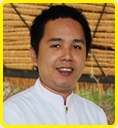
I was born on March 2, 1981, in Bangkok, Thailand, to a father who is a traditional Thai music instructor. Naturally, my father became my first music tutor and I learned a lot from him. But as I grew both physically and musically, I thirsted for more knowledge. When I was around ten years old, I started taking additional classes in the traditional Thai music club in my school. While in that club I wasn’t only studying music but also meeting new friends, which in turn created an even greater learning atmosphere for me.
A brief deflection occurred when I was in high school when I wanted to experiment with even more genres of music, so I joined the school’s marching band. I played a number of different western instruments - trumpets, snare drums, and bass drums, to name a few. Although I have forgotten how to play most of them now, that period gave me a background in the general concept of international music that is very valuable for my life as a professional musician.
When the time arrived for me to choose whether or not to go to college, I quickly decided to go, and got accepted into one of the most prestigious music colleges in Thailand. During this phase, I devoted all my time, energy, and attention to perfecting the craft of playing the ranad.
Since college, I have participated in many projects and session bands playing the ranad and many other Thai music instruments. I do not want to limit myself and play only in traditional Thai ensembls, so I try my hands at many other styles of music and join various sessions in jazz, fusion, and contemporary styles as well, just to name a few. I believe that in order to develop one’s own specialty, one cannot limit oneself but instead broaden one’s horizons as much as possible.
After college, while still teaching music on weekends and participating in bands, situations required that I get a permanent position in a Japanese company focusing on security systems, something that does not have anything to do with music at all. I continued working there for five years. But, at the end, after giving it a lot of thought, I realized that my life should be about music. So I quit that position and returned to creating and teaching music full time.
At present, I hold private music classes on weekdays and teach at the Laung Pradit Phairoh Foundation on the weekends. I also take on a lot of interesting projects, such as this one. This kind of cooperation between countries is very important for the survival of the traditional music as a whole, for even though all Thai students have an encounter with traditional Thai music at some point in their school lives, those encounters are mostly brief and often leave little or no impression. We need to be able to show that Thai traditional music is still relevant, that it is important, that it is possible for traditional Thai music to be ‘cool,’ and that the musicians themselves are able to the live their lives without having to resort to other professions.
I am determined, now more than ever, to continue championing traditional Thai music, to be a good example for the following generations of musicians to come, and to pave the way to bring traditional Thai music into the spotlight of the international arena. I am devoting my life to the everlasting practice of the traditional Thai music, following the dictum, ”if music be the food of love, play on.”( Twelfth Night, or What You Will, Shakespeare )
(interview on July 2, 2013)
![]() THAILAND
THAILAND
CHRIS SHINING STAR (LOVEiS)
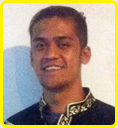
I was born in Paris, France, in 1983.
My father was a singer, of jazz and pop, so I was brought up in a musical environment.
I was brought up in Paris until I was 12, then in 1994 we moved to Bangkok. I attended a French school after moving to Bangkok, so for a long time I didn't know anything about Thai music, be it classical or popular.
Until the age of 18, I spent two or three years having guitar lessons and I also had some singing instruction, but mostly I was taught by my father.
I didn't start thinking about becoming a singer until I was around 17 years old. Until then, I was just a boy who was ordinarily fond of music.
Then, I discovered Thai pop music. Since that moment, I've been immersed in the world of Thai pop.
The reason that I got involved in Thai pop was because the music market in Thailand is very clear in what it likes, and as a result it's difficult to achieve success as a professional if you're singing jazz or funk in any language other than Thai.
At the moment, in Thailand, it's very hard to do things which are traditional or which are thought to be artistic. The range of music accepted by the market is extremely narrow.
But I don't want to think too much about the future.
I want to concentrate on what's in front of me now, and work hard to make a contribution to Thai music.
(Interview on July 2, 2013)
![]() LAOS
LAOS
SENGTHONG BOUTXADY
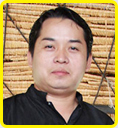
I was born on August 9th,1975 in Saylom Village, Chanthabouly District, Vientiane Capital of Lao P.D.R. My father was a government officer and my mother was a merchant. We were not a family of musician.
When I was 8 years old, my mother took me to our village festival, there I had a chance to see a performance of ‘Drum Set’. After arrived home, I collected cans, lid and bucket to make a drum set and also called up my friends to play as a band.
After I finished primary school, my parents supported my love of music as sending me to study drum set and traditional drum at National School of Arts.
The most favorite musical instrument of mine is drum and I also love and want to learn other musical instruments too.
After graduated the secondary school, I became a teacher at the school and later on I decided to continue my study at Art Educational College but after I graduated the college, I am still continuing to be a drum teacher at the National School of Arts.
In my hometown, there is only one place so called Children’s Cultural Center (CCC) where children with less opportunity can learn traditional music for free. Even though there are not many places to learn traditional music but I hope that I could be a part of promotion for traditional music in order to have gradually developed it comparing to the past and I am also willing to make it more popular among Lao society and make people around the world know it better in the future.
![]() LAOS
LAOS
PUTTHAVONG SAKDA
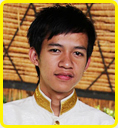
My name is Putthavong Sakda (Tim). I was born on 9th September 1992 in Sibounhueang Village, Chanthabury District, Vientiane Capital, Laos. I was born in the family who knew nothing about music.
I started joining Lao Music and Sport Club when I was 10 years old. At the first time, I joined the soccer club but after that I found the interesting of musical instruments there and it was very attractive. So that I joined the music club and I was very lucky that my teacher, Mr.Khamsuan Vongthongkham, who is a famous national musical teacher and is the founder of this club, has given me a chance to join the music club and help me develop my skills of music. I started my first musical instrument ‘Khean’, a type of mouth organ since I was 15 years old and it has been developed to other skills of music such as ’Base Drum’ too.
In 2007, I had a chance to have a cultural exchange program in France. There, I found the fascination of Lao traditional music. It has its own characteristic comparing to other countries’ music. It was such a good experience which made me curious about Lao traditional music and want to be a professional traditional musician.
Later on, in 2008-09, I also had some chances to perform for cultural exchange programs in Korea and Japan in order to be a representative of Lao musician to perform our own culture to foreigners. Now a day, I am a teacher at Lao Music Danxang Club where less opportunity children who live in an outskirt of Vientiane Capital can learn traditional music for free. I prefer to reserve Lao traditional music to let the next generation know that ”Lao traditional music is also fantastic and has its own characteristic” and I hope that in the future there will be gradually increasing of young people or new generation who are interested in playing Lao traditional music.
![]() BRUNEI
BRUNEI
YUSRI
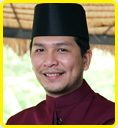
I was born in Bandar Seri Begawan, the capital of Brunei.
Both of my parents were pop singers.
My father started his career as a police officer, but he and my mother were also singers and they formed a band called Seroja. This was in the 1960s.
So there was always music in my home, from the moment I was born. In fact, my mother tells me that when I was three, she sang me a song, and after she had finished, to her great surprise, I sang it right back to her, note-perfect.
I loved to sing with my friends, and was always singing, and when I was eight years old, I entered a singing contest for children. But I didn’t win anything.
The next year, I entered again, and this time I won the top prize. I carried on winning, taking the top prize in almost all the contests I entered.
At that time, I wanted to become a composer, so I taught myself the piano and the synthesiser, and started to write my own songs.
When I was a student, I was in a fusion band; we modelled ourselves on the Japanese band T-Square. I played the keyboard and the alto saxophone.
I was very committed to the band, but in Brunei there is not much of a music scene. So becoming a “professional” musician in Brunei is somewhat different from other countries. So perhaps I wasn't a professional in the accepted international sense, but I did play at many different venues.
After that, I became a flight attendant for Royal Brunei Airlines, but I still carried on with the band. I also worked at a radio station as a composer; I wrote a lot of jingles.
After around a decade of working as a flight attendant, the Ministry of Culture, Youth and Sports established a professional group of traditional musicians, and I became part of that group.
I had been called upon by the Ministry before, to participate in performances of traditional music as a singer. Indeed, when I was 16 years old, I won first place in a folk singing contest.
But it was not until 2008, when I joined the ensemble established by the Ministry, that I was really able to take part in authentic performances of traditional music.
I am incredibly grateful to my parents, especially my mother, for seeing the talent for music within me.
This project is about communicating the culture of Brunei, something that I am committed to doing to the very best of my abilities. The current Minister of Culture, Youth and Sports is an extremely passionate person and I think the project is going well.
It can be difficult to get really involved with traditional music. Without real perseverance, it is hard to really get to grips with its true essence.
The music of Brunei takes as its roots the musical traditions of the Malay people, upon which are layered Islamic influences from the Arab culture. Our music is an important part of the history of Brunei.
I want to teach young people about our music and communicate to them the importance of tradition. I particularly want to teach the next generation about our traditional styles of singing.
(interview on July 2, 2013)
![]() JAPAN
JAPAN
HORI TSUBASA
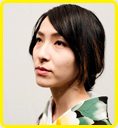
I am from Kyoto, in Japan.
I started learning the piano at the age of three, and then, when I was in fifth grade at elementary school, I discovered taiko. It was when I went along with my mother to a practice session of her taiko group.
I loved music, and I played wind instruments at junior high school. I then enrolled in a senior high school specializing in music. Around that time, I had formed a rock band with friends, and after graduating from high school we spent around a year trying to go professional.
I was a fan of British rock music, and I decided that I wanted to travel to London to train further as a drummer. So I made an initial trip to London to get my bearings.
Of course, when I arrived, I realized that everyone in England spoke English, and was surprised by how physically large everyone was. Purely and simply, I got culture shock. All of my aspirations were quickly transformed into a complex-would I ever really be able to understand the music of these people, and to play it? And surely trying to do the impossible was meaningless?
So I really struggled to decide what I should do.
The experience prompted me to start thinking that I wanted to do something that was intrinsically linked to my Japanese nationality-to do something that was unique to the Japanese. I determined to learn about the world of taiko, the drums which I had been familiar with since I was very young.
So I travelled to Sado Island where I was accepted as a trainee into the Kodo ensemble. That was when I was 19 years old.
Since then, as a member of Kodo, I have been part of many tours and recordings, and have also written original pieces.
Then, around the time I had built up 14 years of experience with Kodo, my life underwent another big change, and I moved to Antwerp, in Belgium.
I still live in Antwerp today, performing with a number of different musicians. I am also involved in scoring and performing the music for international collaborative dance pieces, such as ‘TeZukA’, which was performed in Japan in 2012. I also take part in the tours for such pieces.
Many things have changed since I moved to Antwerp, but the most fundamental among them is the way in which I have come to feel about singing Japanese songs-now that it is hard for me to return to Japan as regularly as I should like, I consider these songs very precious. The songs of Japan really touch me deeply now. These songs have helped me to cope with the feelings of longing I have for my home country.
The taiko music of Japan is not actually traditional music in the way that most non-Japanese assume it to be. It is, in fact, a fairly new style of musical performance by a new type of ensemble-albeit using traditional instruments-developed by a single musician in the years following the end of the Second World War. The style he invented then started to become increasingly popular.
Ever since I joined the Kodo troupe, I have had many opportunities to experience traditional music, Noh, kabuki, and the folk music of Japan, and indeed to be taught about these various performing arts. However, I never really felt that any of them really belonged to me.
In that sense, I still feel something similar to the emotions I felt when I first travelled to London as a teenager. As if I am a wanderer without roots, as if I do not have tradition as a foundation.
Still, every tradition had to start somewhere, and before they became traditions, there would have been a time when they were still “new”. I find this thought a comfort as I continue to write and perform music.
Now, I want to create music according to what personally inspires me, without thinking too hard about what my roots are, while still cherishing the rhythms and songs of Japan.
I believe now that giving my own interpretation to the music I encounter will lead me forwards to something new.
(Interview on July 13, 2013)
[Contact Us]
The Japan Foundation
Arts and Culture Department, Asia and Oceania Section
Person in charge: Genda (Mr.)/Matsunaga (Mr.)
Tel: +81-(0)3-5369-6062
- What We Do Top
- Arts and Cultural Exchange [Culture]
- Japanese-Language Education Overseas [Language]
- Japanese-Language Education Overseas [Language] Top
- Learn Japanese-language
- Teach Japanese-language
- Take Japanese-Language Test
- Know about Japanese-language education abroad
- The Japanese-Language Institute, Urawa
- The Japanese-Language Institute, Kansai
- Japanese-Language Programs for Foreign Specified Skilled Worker Candidates
- Japanese Language Education for Japanese Children Resident Overseas and for the Descendants of Migrants
- Archives
- Japanese Studies and Global Partnerships [Dialogue]
- JF digital collection
- Other Programs / Programs to Commemorate Exchange Year
- Awards and Prizes
- Publications
